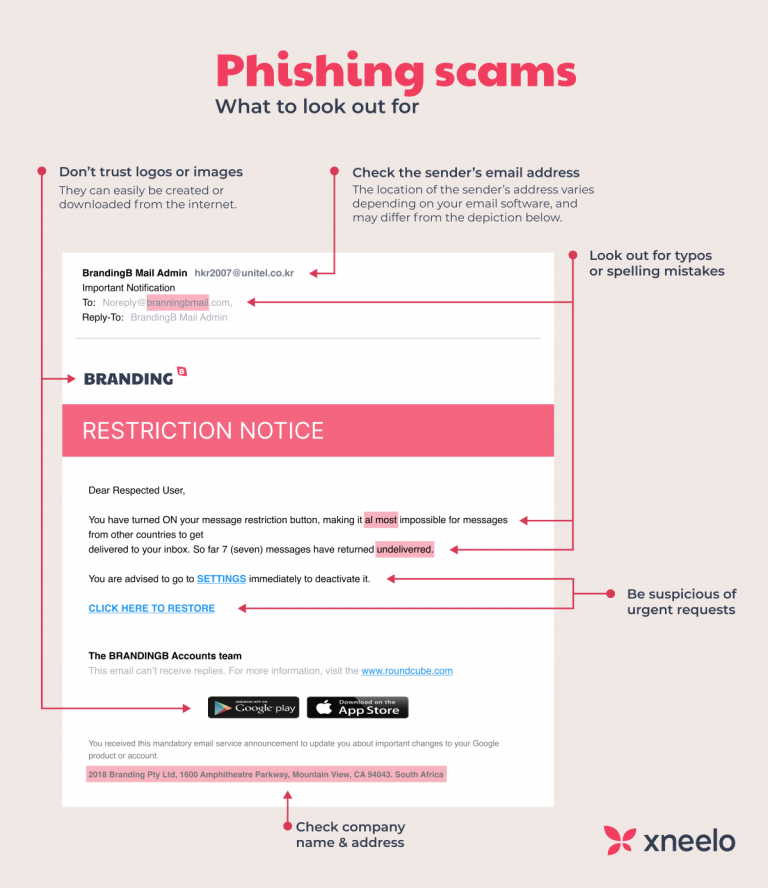Phishing on the rise
Phishing alert – protect yourself from online scams
Phishing scams are getting more sophisticated. Staying alert to common threats and increasing your awareness is crucial for businesses operating online – especially during peak shopping seasons when online activity is at its highest.
Here are some tips to avoid getting caught out by a phishing scam.
What is phishing?
Phishing is a type of cyberattack where victims receive an email or text message from what they think is a trusted source, but is actually a clever fake designed to trick them into sharing sensitive information like usernames, passwords, credit card numbers, or other confidential data. This data can then be exploited for fraud, identity theft or other malicious purposes.
How to identify a phishing scam
Phishing emails are easy to spot if you know what to look for. Keep an eye open for:

Phishing scams are getting more sophisticated. Staying alert to common threats and increasing your awareness is crucial for businesses operating online – especially during peak shopping seasons when online activity is at its highest.
Here are some tips to avoid getting caught out by a phishing scam.
What is phishing?
Phishing is a type of cyberattack where victims receive an email or text message from what they think is a trusted source, but is actually a clever fake designed to trick them into sharing sensitive information like usernames, passwords, credit card numbers, or other confidential data. This data can then be exploited for fraud, identity theft or other malicious purposes.
How to identify a phishing scam
Phishing emails are easy to spot if you know what to look for. Keep an eye open for:
- Spelling mistakes or bad grammar
- An unfamiliar or strange sender email
- A strange URL
- A sense of urgency to take action
How to protect yourself from phishing
What to do if you have fallen for a phishing scam
If you have fallen victim to a phishing attack, here are some immediate steps you should take:
Remember, at xneelo, we will never ask for your personal information via email.
- Be suspicious of urgent requests
- Don’t open unexpected attachments or follow links
- Never send personal or financial information via email
- Use two-factor authentication
- Educate your team on how to identify a phishing email
- Put email spam filters in place
- When uncertain, confirm directly with your provider
What to do if you have fallen for a phishing scam
If you have fallen victim to a phishing attack, here are some immediate steps you should take:
- Change any passwords that were affected
- Run a virus scan to ensure your device hasn't been infected with Malware
- Report the attack to the business the email pretended to be from
- If your credit card details were compromised, cancel them immediately and call your bank’s fraud support line
- Enable two-factor authentication as an extra layer of security
- Review your credit card and bank account statements
- Contact the authorities. Cybercrime.org.za is South Africa’s national fraud and internet crime reporting centre
Remember, at xneelo, we will never ask for your personal information via email.
Related Articles
Installing HTML email signatures in Microsoft Outlook (on Windows machine)
If you have comissioned a custom email signature from us, or created your own, here is how to install it in Microsoft Outlook: Step 1: Add a New Placeholder Signature In Outlook, go to File > Options > Mail and click on “Signatures“. Click “New” to ...Preventing email spam
Email spam is something we all have to deal with on a daily basis. It can be very frustrating and the one question that gets asked over and over again is how do go about preventing email spam? To answer that – we need to find out what exactly SPAM ...Introduction to Zoho Mail
Take your email communication to the next level through Zoho Mail's modern-day emailing features. Watch the below video for an introduction to Zoho Mail. Video topics covered: 0:00 Webinar agenda 1:15 Introduction to Zoho Mail 1:52 Composing ...Configuring Zoho Mail in Outlook as an IMAP Account
Launch the Microsoft Outlook application in your Windows system. Click File and select Add Account. Locate and select 'Manual setup or additional server types', and click Next In the ‘Choose Service’ page, select 'POP or IMAP', and click Next. In ...Email Spoofing
We know that email spam has seen a massive increase ever since the lockdown. SPAM is frustrating, but at least easy to spot. There is a form of SPAM though that is increasing and a little harder to identify if you are not sure what to look for. This ...